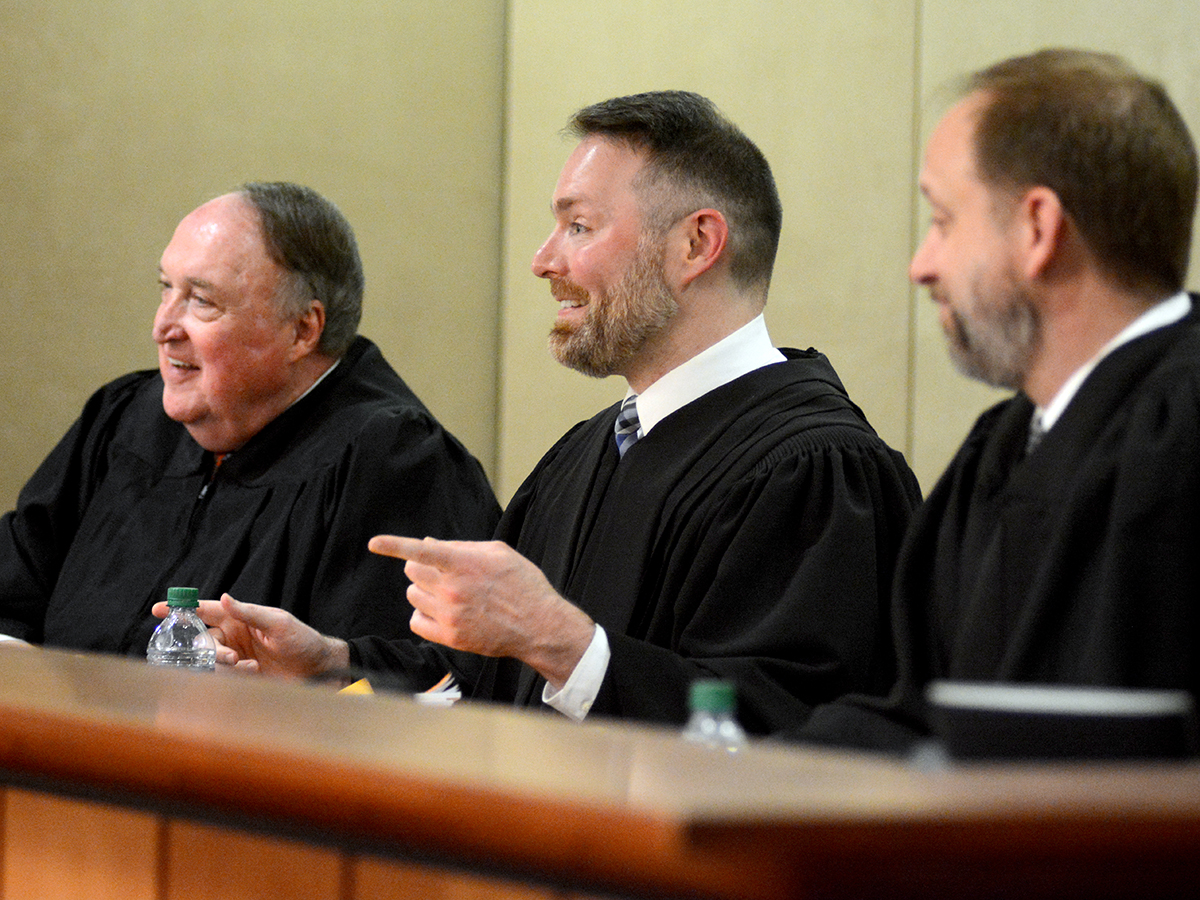Judges from the North Carolina Court of Appeals heard oral arguments on March 4 in the case of a man convicted of drug possession who alleges an illegal search by police, and a civil lawsuit brought by the estate of a man killed when his riding mower overturned at a construction site.
The North Carolina Court of Appeals returned to Elon Law this month for arguments in two cases that allowed students to observe in person the tactics and strategies of experienced appellate lawyers.
A three-judge panel of the Hons. Richard Dietz, John M. Tyson, and Toby Hampson fielded student questions after the afternoon arguments concluded in Elon Law’s Robert E. Long Courtroom. Decisions in both cases will be issued in the months ahead.
“Observing appellate arguments is a way for students to learn not only how the facts of a case are presented at trial but how case law and constitutional rights may have, or should have been, applied to those facts,” said Elon Law Associate Dean Enrique Armijo. “And we know from past visits by the North Carolina Court of Appeals that attending arguments in person has moved some of our students to consider clerkships as the first chapter of their legal careers.
“We can’t thank the judges enough for what they do to inspire Elon Law students to think more broadly about the legal profession.”
Prior to the arguments, the judges dined at a nearby restaurant with Elon Law students who have expressed a strong interest in clerking.

Summary of the Cases:
State v. Duncan: After his conviction on two counts of felony possession of cocaine, the appellant alleges that the trial court erred by failing to suppress evidence because its discovery occurred due to an unlawful search and seizure; and failing to dismiss a charge of possession of cocaine where that charge was merely a lesser included offense of possession with intent to sell or deliver and the distinct acts of possession were not separated in time and space.
Hidalgo v. Erosion Control Services.: In 2016 a riding mower rolled over on a job site, killing the operator. In this interlocutory appeal, the lower court denied a motion for summary judgment by the company that owned the mower. Lawyers for the company appealed the denial of summary judgment and claim the trial court lacked subject matter jurisdiction due to the exclusivity provisions in the North Carolina Workers’ Compensation Act. They also claim an individually named defendant in the wrongful death lawsuit has no individual liability for the acts of the corporation.

Student Reflections on the Court of Appeals
“Attending an oral argument in Elon Law’s courtroom was an exciting, firsthand look at what I will experience during my residency at the North Carolina Court of Appeals. I am grateful to have had the opportunity to observe the attorneys’ compelling legal arguments and ask questions during the Q&A session. If any student is interested in appellate practice or advocacy generally, I highly recommend that they attend this event each year.” – Cynthia Hernandez L’20
“It was important for me to attend arguments so I could gauge the level of detail involved in an appellate hearing. I’m very interested in litigation and was in awe of the attorneys from both sides as they readily recalled information at the request of the court. I was surprised by how each side wielded the rules of civil procedure so masterfully without consulting co-counsel or additional resources.” – Zechariah Etheridge L’21

“As a student on my residency this trimester at the Court of Appeals in Raleigh, I have felt disconnected from the law school. I enjoyed sharing lunch and conversations outside of chambers with Judge Dietz, who is my residency advisor, alongside my Elon classmates and faculty. It was like seeing two worlds collide in Greensboro in a most friendly and intellectual way.” – Edwina Avbuere L’20
“Having lunch with the judges was beneficial as we were able to speak with them as people in ways law students often don’t get the chance to do. Having the opportunity to interact with the judges and ask questions away from the bench about their backgrounds, their path to becoming a judge, and their thoughts on various legal issues was insightful. Additionally, as a student who will be doing a residency next trimester with a judge on the U.S. Court of Appeals, the opportunity to receive advice and tips from other judges on how to be a successful clerk was very helpful.” – Hunter Cornelius L’20



